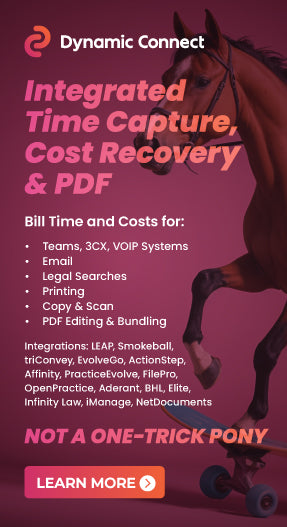
The Power of Client Endorsements
It’s hard to deny, clients today are particularly sceptical. So, one of the most difficult challenges that each of us as professionals face, is coming up with a convincing response to this one critical question: “As a prospective client, tell me please, why should I choose you (or your firm); what makes you distinctive and what added-value do you bring to my business matters ... that I cannot get anywhere else?” (and please do notice those last six words!)
Now you might be able to answer that question with a bold assertion and making a bold claim may be important to get your audience's attention. However, supporting that claim is even more critical if you want to convert attention into action. To support any assertion, proof speaks the loudest. So, when you say something about yourself, it's bragging. BUT, when other people say it about you, it's providing proof. That is the essence of any public endorsement. One of the ways to prove that you have something meaningful to offer and evidence that you are better than your competition is to produce a few forceful and persuasive client endorsements.
An endorsement is usually a written communication from a client that talks about what is special about you, your actions, your efforts or your results. Preferably that endorsement should describe the work undertaken, highlighting the success achieved, and include a comment that reinforces that this client is happy to recommend you. The power of having someone, especially if they are credible, endorsing your service can be the key that unlocks the doors of the subconscious mind. It is tangible evidence that allows you to showcase the specific ways you are meaningfully differentiated from competitors.
Endorsements can be used to say things about your firm and your services that you could never say yourself, but most importantly they should:
Evidence success - Clients want to work with those firms who have a track record for producing results — “Smart & Smarter guided us through all of the pitfalls involved in outsourcing our manufacturing operations and helped us save over $7 million in operating costs in the first year.” Ask yourself; do any of your current client testimonials make you want to do business with your firm?
Build trust - When a prospective client reads a written endorsement about how you and your firm are a leader in their particular industry niche, as someone who always goes the extra mile to provide exceptional service, the commentary is more likely to be seen as objective feedback and oftentimes viewed as more trustworthy. Do you think that your current client endorsements resonate with prospects and give them the confidence to trust you?
Provide credibility -Your potential clients, especially the Fortune 500, want reassurance that you have served companies of their stature, or in their industry, or with their particular problem and therefore understand their mission-critical issues. Third-party objective successful experiences are usually much more believable and credible than paid advertising. So how much does your firm spend on paid advertising each year and what are your plans for obtaining compelling client endorsements?
Now, how do you go about getting great endorsements? Perhaps not surprisingly, the answer is the same as it is for receiving unsolicited referrals; first, you have to ensure that you have earned them! So, you need to:
Understand your client’s expectation
To have any hope of obtaining winning endorsements you must be known as a professional who performs in accordance with and hopefully exceeds your client’s expectations, which means that you need to invest the time to ensure that you clearly understand those expectations.
Keep your promises
Clients expect a lot, and they expect it when they need it. You need to be the professional who delivers everything you promised and more, on time or sooner.
Be proactively remarkable
When you stand out from other professionals you will be talked about. Being remarkable means going the extra mile and making service the forefront of your offering, not an add-on. Help your clients learn and grow. Don’t just solve their current problem, help them anticipate and avoid future problems.
Provide enormous benefits
Help your client save money, time or anything else of value to them. Help them increase or improve efficiency, throughput, or control. That is how a benefit is described. Benefits help people save, reduce, control and decrease costs or expenses. Benefits help people increase, improve, enhance or gain money, efficiency or time.
Obtain business for them
While not always possible, this is the most valuable thing you can do to secure loyal relationships and endorsements. Figure out a way to introduce your client to important contacts, find them networking opportunities, or find some way to be the conduit to helping them get new business.
Once feeling like you truly have earned the endorsement, you may still have to ask for them.
Before you ask, I would be willing to bet that you are already getting spontaneous endorsements. It is always amusing to see firms make a big deal out of identifying certain endorsements as “unsolicited.” Unsolicited endorsements are those that arrive via email, ordinary mail, seminar feedback forms, or simply from random conversations, without any effort on your part. Think back to the last time someone sent an e-mail to thank you for some recommendation that you provided, commented on the intellectual brilliance of your latest article, or perhaps commended you for responding to their question so quickly and thoroughly. These are endorsements in the making. If you were to simply respond – the same day – thanking them for their generous comments and asking permission to use what they wrote, you have an unsolicited commendation.
Have you ever been a speaker, perhaps on a panel, when someone in the audience later approached and commented to you about how much they enjoyed your insightful presentation? When someone says something you like, let him or her know you’re flattered and that what they have said would be perfect for an endorsement. Ask them if it would be okay for you to write up what they said and send it to them for approval in the morning. And you know the old adage: strike while the iron is hot. Waiting more than a couple of days after an incident occurs, significantly lowers your chances of taking advantage of this opportunity.
Now, solicited endorsements are those you consciously pursue. You might start by listing ten clients you consider your most important, high-profile, or influential. In order to obtain an endorsement that is powerfully persuasive and becomes part of your market positioning, you should try to get a testimonial from a recognized / influential commentator or expert on how you have helped address and solved a problem that is a representative of the problems experienced by your targeted client group. A persuasive written example will help you to tell your story and show that you know something about a specific problem, issue, market, or business.
If you want great endorsements, you have to ask for them. Most often, your clients being smart business people understand the nature of your request. Call them, tell them what you need, treat them to breakfast or lunch; and also give some thought to what you can provide them of value (an idea or lead) at the same time, to help earn your endorsement. That said, generally, you won't experience difficulty in obtaining a reference, as you will only be asking those clients who are deliriously happy with your work. If you feel in any way awkward about asking any client for this favour, it should be a clear signal that your relationship with them may be at risk.
You might want to consider inserting a clause in your retainer agreement, that makes obtaining an endorsement, a standard part of doing business with your firm: "After completing this transaction and obtaining your financing (our firm) would like to feature our work together in a formal written example of the services we are proud to provide." A clause like that can set an expectation, at the very beginning of a specific matter, that an endorsement will be furnished right after the project is completed.
In some situations, it pays to help people write your endorsement. Perhaps they’re extremely busy, perhaps a bit uncomfortable about how to actually write an endorsement, or sensitive to not wanting to disappoint you. In these cases, you might offer to write the confirmation statement for them. Simply interview them about their experience with your firm; write up your notes – including all the main points they made and use as much of their actual terminology as possible. Write two different versions to allow them to choose which they prefer. After you’ve drafted the two endorsements, include another section titled “I Can Do Better Than That” and leave some blank space for your client to write an original statement. If they do make any changes, it inevitably ends up being much better than what you originally wrote.
What should your endorsement say?
Take a moment and look at any of the written references you currently have. Ask yourself objectively if they would prompt you to pick up the phone. Or do they merely communicate the same old trite message: "These are wonderful folks to work with and I have been doing business with them for years." That sounds nice but doesn't have any compelling power.
To be truly powerful and convincing, your endorsements need to articulate as many of these attributes as possible:
- be phrased in a way that removes a risk or neutralizes a fear
“I was extremely concerned that our company would be vulnerable to significant punitive damages, but with your expert guidance we were able to take effective preventative action.”
- overcomes a prospect’s potential objection
"Initially, I thought your firm’s fee quote was rather steep, but now in retrospect, I have come to realize they what would have been extremely expensive, is if we had retained a firm which had only limited experience with these kinds of financing deals and wasted our precious time with us helping them learn the ropes. Your firm definitely provided us with the best value."
- defines a benefit
“Helping our company license our intellectual property allowed us to expand our market reach, develop three important strategic alliances, and improve our profitability by 64 per cent last year.”
- focuses on the specifics of the professional
“Jerry Ward was not only responsive to returning every call within the hour, but he managed to get his team of lawyers to work non-stop, through an entire weekend to close our deal within the tight time-frames it required.”
- has an "act now" impact
"Up until last summer we used a different firm for all of our tax work but having now switched to your firm we find that we get far more proactive tax counsel and believe that every company in our industry would benefit from similar advice.”
- reinforce your claim
"The extra effort put forward by members of your client team has resulted in our legal department being far more knowledgeable and able to draft the required privacy protocols for our various business units.”
Here’s a Test Question: Which of these endorsements engages you?
“Wow was I surprised. When we first contemplated the complexities of our first share issue, I never thought I could get my securities questions answered so quickly.” OR “We got our securities questions answered quickly.”
Wouldn’t you agree on the first, because the underlying emotion in it, actually draws the reader in more? Don’t lose the ‘flavour’ or emotion of your endorser. Very often, some intense feelings or the slightly quirky phrases that someone uses in writing the testimonial are the very words that will make a special connection with the reader. Don’t be tempted to edit them out. Keep the endorsement in the writer’s own words.
Always include a name at the bottom. Unless an endorsement has a name attached it’s NOT believable. And, if it is not fabulous, don’t use it. It’s better to have no endorsements at all than to use weak or unbelievable references. Only use those that truly support your practice objectives.
Strategic Variations
Endorsement Letters – There is a variation known as an endorsement letter, that deserves special mention. In this process, Firm A (the host and let’s say this is an accounting firm) agrees to let your firm (the beneficiary) deliver a promotional message to Firm A’s clients. You might even write an endorsement letter introducing and recommending your services to their clients. Firm A simply approves your writing and “signs” the letter. This is a very powerful and cost-effective technique as the cost of sending an offer to each of Firm A’s clients is minimal. The beauty of this technique is that the clients of Firm A are more susceptible to hearing from you since Firm A, which they already know and trust, is implicitly recommending you. To make this work, you need to look for firms that target the same type of client you seek and are not competing directly with you. Think about the various aspects of your practice and the firms that you could approach to start a profitable and mutually beneficial relationship.
Launching A New Practice Area – If you’re launching a new practice or dramatically changing the focus of your existing practice, you might think about using endorsements to support your new endeavour. Perhaps to help launch your new practice you’ve done some substantive research and decided to present a workshop or seminar to existing and prospective clients. You can often get pre-event references by forwarding your seminar notes or outline to business contacts or colleagues for review. Tap your network, ask your friends, and look to your past clients. With a bit of persistence – you should be able to get several credible endorsements well in advance of presenting your seminar. Now use those to give credibility to your actual seminar offering and build trust in your presentation expertise. At the seminar itself, ensure that participants are allowed to provide written commentary at the end, especially to identify what they liked about your seminar content (“what was the most valuable to them?”). Now use those seminar endorsements to evidence your knowledge and expertise as it impacts the new practice area.
Using Your Endorsements
Before you purchased your last book, did you flip to the back cover to read what other people had to say about it? As an author, I learned from some of my more experienced brethren that one good way to promote your newest work was to get well-respected peers to write favourable advanced praise and then include that commentary all over the front and back covers of the book jacket. When you admire the person who provided the quote, it adds instant credibility to the book.
While endorsements must be used in the proper manner, don’t limit your creativity. You can include them among your materials for use in RFP proposal presentations; or in client newsletters; post them on your website, on different pages and in borders so they remain in view; and you might even include an endorsement in your e-mail signature (ideal to rotate them). One firm I know compiled a promotional brochure made up completely of only client endorsements.
Most often, we use endorsements to get our foot in the door. Obviously, if that is the only way to initiate contact with the prospect, do it. But the real power of an endorsement is in the proof it offers when the potential client is ready to decide. Endorsements should be used at the end of the selling process to dispel any doubt, eliminate risk, substantiate value, and pave the way to your engagement proceeding.

Patrick J. McKenna, an internationally recognized author, lecturer, strategist, and seasoned advisor to the leaders of premier law firms.
Also read top viewed Ai Legal article: The Role of AI in Legal Research.







